Films by Title
This is a long list. However, do search the online catalog to see if we have other, relevant titles.
-
Al-Makhdūʻūn = The Dupes byCall Number: Jones Media Video Tape #5942Publication Date: 1991Two men and a boy try to be smuggled into Kuwait to find work and escape the poverty and apathy of the Palestinian refugee camps.
-
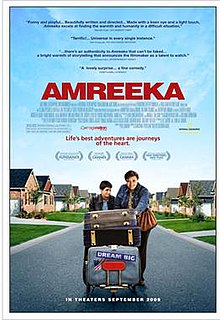 Amreeka
by
Call Number: Jones Media DVD #9778ISBN: B002T921C0Publication Date: 2003Muna Farah, a Palestinian single mom, struggles to maintain her optimistic spirit in the daily grind of intimidating West Bank checkpoints, the constant nagging of a controlling mother, and the haunting shadows of a failed marriage. Everything changes one day when she receives a letter informing her that her family has been granted a U.S. green card, and she moves with her teenage son to small town Illinois.
Amreeka
by
Call Number: Jones Media DVD #9778ISBN: B002T921C0Publication Date: 2003Muna Farah, a Palestinian single mom, struggles to maintain her optimistic spirit in the daily grind of intimidating West Bank checkpoints, the constant nagging of a controlling mother, and the haunting shadows of a failed marriage. Everything changes one day when she receives a letter informing her that her family has been granted a U.S. green card, and she moves with her teenage son to small town Illinois. -
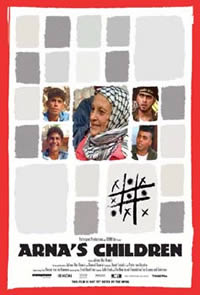 Arna's Children
by
Call Number: Jones Media DVD #16508Also available on YouTube. ARNA'S CHILDREN tells the story of a theatre group that was established by Arna Mer Khamis. Arna comes from a Zionist family and in the 1950s married a Palestinian Arab, Saliba Khamis. On the West Bank, she opened an alternative education system for children whose regular life was disrupted by the Israeli occupation. The theatre group that she started engaged children from Jenin, helping them to express their everyday frustrations, anger, bitterness and fear. Arna's son Juliano, director of this film, was also one of the directors of Jenin's theatre. With his camera, he filmed the children during rehearsal periods from 1989 to 1996. Now, he goes back to see what happened to them.
Arna's Children
by
Call Number: Jones Media DVD #16508Also available on YouTube. ARNA'S CHILDREN tells the story of a theatre group that was established by Arna Mer Khamis. Arna comes from a Zionist family and in the 1950s married a Palestinian Arab, Saliba Khamis. On the West Bank, she opened an alternative education system for children whose regular life was disrupted by the Israeli occupation. The theatre group that she started engaged children from Jenin, helping them to express their everyday frustrations, anger, bitterness and fear. Arna's son Juliano, director of this film, was also one of the directors of Jenin's theatre. With his camera, he filmed the children during rehearsal periods from 1989 to 1996. Now, he goes back to see what happened to them. -
 Be quiet
by
Call Number: Jones Media DVD #19414Publication Date: 2005On their journey home, a Palestinian boy and his father are beset by the tensions of a politically charged and militarized reality ; an atmosphere that serves as a foil to the struggles of a father bringing up his son.
Be quiet
by
Call Number: Jones Media DVD #19414Publication Date: 2005On their journey home, a Palestinian boy and his father are beset by the tensions of a politically charged and militarized reality ; an atmosphere that serves as a foil to the struggles of a father bringing up his son. -
Between the lines byCall Number: Jones Media Video Tape #6351Publication Date: 2001Amira Hass, a reporter for ha-ʻArets (Tel Aviv, Israel), is the only Israeli living in Rām Allāh, West Bank. Raised in a Communist family and the daughter of a Holocaust survivor, she has a horror of inaction in the face of injustice. Hass is a recipient of the International Press Institute's World Press Freedom Hero prize.
-
A boy, a wall, and a donkey: stories on human rights byCall Number: Streaming videoIntent on making a film, a group of resourceful young boys don't let limited resources stand in their way. They decide to go where the cameras are, even if that means the middle of the Gaza Strip.
-
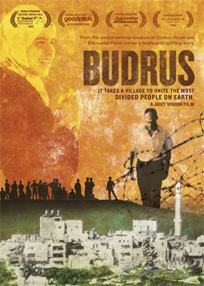 Budrus
by
Call Number: Jones Media DVD #16440ISBN: B004J169PQPublication Date: 2009They not only save the village, but the Barrier is pushed back behind the Green Line into No Man's Land. In the process, Ayed and Iltezam unleash an inspiring, yet little-known, movement in the Occupied Palestinian Territories that is still gaining ground today. In an action-filled documentary featuring archival footage of this movement from its infancy, Budrus will inspire and challenge audiences worldwide.
Budrus
by
Call Number: Jones Media DVD #16440ISBN: B004J169PQPublication Date: 2009They not only save the village, but the Barrier is pushed back behind the Green Line into No Man's Land. In the process, Ayed and Iltezam unleash an inspiring, yet little-known, movement in the Occupied Palestinian Territories that is still gaining ground today. In an action-filled documentary featuring archival footage of this movement from its infancy, Budrus will inspire and challenge audiences worldwide. -
Chatila, Beirut 2001 byCall Number: Jones Media DVD #4869Publication Date: 2002Living conditions in a refugee camp for Palestinian Arabs in the suburbs of Beirut as seen through the eyes of the children. The film explores themes such as: the experience of exile and Palestinian national identity in the diaspora; the cult of martyrdom; and the role that the media coverage of the current intifada has played in politicizing youth in the camp.
-
Children of Ibdaa: to create something out of nothing by
Call Number: Streaming videoPublication Date: 2002A Palestinian children's dance troupe from a West Bank refugee camp uses performance to express the history, struggle, and aspirations of the Palestinian people in a creative and non-violent way. ... -
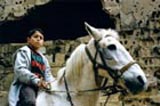 Children of Shatila
by
Call Number: Jones Media DVD #16983Farah and Issa are two Palestinian children who live in the refugee camp of Shatila, home to displaced Palestinians and Lebanese alike. Following the Shatila massacre of 1982, Farah and Issa struggle to lead a normal life, as they deal with the realities of living in a refugee camp. ...
Children of Shatila
by
Call Number: Jones Media DVD #16983Farah and Issa are two Palestinian children who live in the refugee camp of Shatila, home to displaced Palestinians and Lebanese alike. Following the Shatila massacre of 1982, Farah and Issa struggle to lead a normal life, as they deal with the realities of living in a refugee camp. ... -
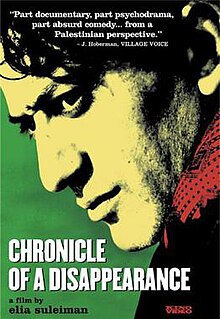 Chronicle of a disappearance
by
Call Number: Jones Media DVD #5962ISBN: B000A59QIMThis film provides a personal meditation on what it means to be Palestinian. It examines the effect of the political impasse in the Middle East on the identity of the Palestinian people.
Chronicle of a disappearance
by
Call Number: Jones Media DVD #5962ISBN: B000A59QIMThis film provides a personal meditation on what it means to be Palestinian. It examines the effect of the political impasse in the Middle East on the identity of the Palestinian people. -
Crossing Kalandia byCall Number: Streaming video on VimeoPublication Date: 2002Kalandia is the checkpoint that the director and his wife must cross every time they go to Jerusalem, experiencing the humiliations and the violence of segregation. In contrast with the horror of this daily bullying, the surrounding destruction and the ordinary suffering, Sobhi Al-Zobaidi conveys, in a very personal way, people’s capacity to go on living.
-
Edward Said byCall Number: Jones Media Video Tape #1701Publication Date: 1992Edward Said discusses his postcolonial theory and how it applies to modern culture, from politics to literature. He exposes the Western image of the East as an artificial construct that is still retained today. He discusses Palestine as a politically expedient construct of Europe; argues the right of Palestine to exist as an independent, self-governing nation; and traces the origins of European attitudes toward the Arab world through the literature of E.M. Forster, T.S. Eliot, Joseph Conrad, and Chinua Achebe.
-
 Eid milad Laila = Laila's birthday
by
Call Number: Jones Media DVD #16481ISBN: B002RUNNI2Publication Date: 2009'At eight o'clock, it's Laila's birthday, okay?' Palestinian judge turned cab driver Abu's wife reminds her husband. On his young daughter's birthday, Abu faces a nerve-wracking shift in a Ramallah yellow cab, armed only with an ex-jurist's misplaced pride, a father's loyalty, and a sticker reminding passengers that smoking and carrying AK-47's are prohibited.
Eid milad Laila = Laila's birthday
by
Call Number: Jones Media DVD #16481ISBN: B002RUNNI2Publication Date: 2009'At eight o'clock, it's Laila's birthday, okay?' Palestinian judge turned cab driver Abu's wife reminds her husband. On his young daughter's birthday, Abu faces a nerve-wracking shift in a Ramallah yellow cab, armed only with an ex-jurist's misplaced pride, a father's loyalty, and a sticker reminding passengers that smoking and carrying AK-47's are prohibited. -
 Encounter Point
by
Call Number: Jones Media DVD #6084ISBN: B000R4SKEWPublication Date: 2006"Created by a Palestinian, Israeli, North and South American team, Encounter Point ... tell[s] the story of an Israeli settler, a Palestinian ex-prisoner, a bereaved Israeli mother and a wounded Palestinian bereaved brother ... at the vanguard of a movement to push Palestinian and Israeli societies to ... a new consensus for nonviolence and peace"--Container.
Encounter Point
by
Call Number: Jones Media DVD #6084ISBN: B000R4SKEWPublication Date: 2006"Created by a Palestinian, Israeli, North and South American team, Encounter Point ... tell[s] the story of an Israeli settler, a Palestinian ex-prisoner, a bereaved Israeli mother and a wounded Palestinian bereaved brother ... at the vanguard of a movement to push Palestinian and Israeli societies to ... a new consensus for nonviolence and peace"--Container. -
The films of Kamal Aljafari byCall Number: Jones Media DVD #17247The haunting films of Kamal Aljafari mix documentary, fiction and personal memoir to render complex portraits of the Palestinian communities in Ramleh and Jaffa, now part of Israel. While providing a rare look at the everyday lives of Palestinian Israelis, the films are more than simply sociopolitical treatises of often-overlooked communities and neighborhoods in danger of dissolving. Aljafari instead astutely balances fiction and nonfiction to capture the fragile rhythms of lives lived in a kind of permanent displacement and the strange limbo of neighborhoods subtly yet inexorably transforming.
-
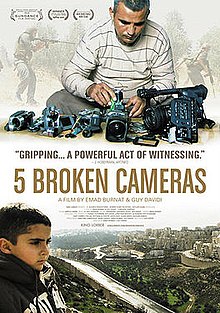 Five broken cameras
by
Call Number: Jones Media DVD #15684ISBN: B009NI2XVOPublication Date: 20115 Broken Cameras is a deeply personal, first-hand account of non-violent resistance in Bil'in, a West Bank village threatened by encroaching Israeli settlements. Shot almost entirely by Palestinian farmer Emad Burnat, who bought his first camera in 2005 to record the birth of his youngest son, the footage was later turned into a galvanizing cinematic experience by co-directors Burnat and Davidi.
Five broken cameras
by
Call Number: Jones Media DVD #15684ISBN: B009NI2XVOPublication Date: 20115 Broken Cameras is a deeply personal, first-hand account of non-violent resistance in Bil'in, a West Bank village threatened by encroaching Israeli settlements. Shot almost entirely by Palestinian farmer Emad Burnat, who bought his first camera in 2005 to record the birth of his youngest son, the footage was later turned into a galvanizing cinematic experience by co-directors Burnat and Davidi. -
From Palestine with love byCall Number: Streaming videoPublication Date: 2010Mays is 22 years old, lives in occupied Palestine and works at the Palestinian Circus School. She is planning a life together with her Swedish boyfriend, Caspar, and she intends to study at the University of Stockholm. However, the road from dream to reality is not easy. Mays is juggling between her family's expectations and Swedish bureaucracy.
-
Gaza under siege byCall Number: Jones Media Video Tape #4513Publication Date: 2001The Gaza Strip is home to a million Palestinians, most of whom are refugees whose parents and grandparents went there in 1948 after Israel moved in. In this program, we meet Reyidh and Sabah, members of one refugee family trying to cope. This program also examines why the United Nations fails to criticize Israel's aggression and denies Palestinian statehood.
-
Going for a ride? byCall Number: Jones Media DVD #22678Publication Date: 2003Documenting the Art Installation “Going for a Ride?” made by the Palestinian Artist Vera Tamari. The installation is a statement on the aggressive and deliberate crushing of hundreds of privately-owned cars by Israeli tanks in Ramallah and El-Bireh during the military incursions in the two towns in 2002. It focuses on crushed cars because of the powerful meaning cars usually carry: freedom, the open road, travel and movement. In the film, the cars are brought to life again by searching into the memories of those who rode them.
-
Happy days byCall Number: Streaming videoPublication Date: 2006Palestinian life under Israeli occupation. Sansour underlines both the apathy of the western public to media coverage of the conflict and the blurry boundary between that news and entertainment. (Boston Palestinian Film program).
-
Hawal = Looking awry byCall Number: Jones Media DVD #16955A docudrama about a Palestinian filmmaker who is commissioned by an American organization to make a documentary film depicting Jerusalem as a city of peace and coexistence between Jews and Arabs. While making the film, the filmmaker keeps running into situations that are very different from what he is trying to depict. The reality of things on the ground proves to be much stronger than its representation, and it reaches a point where the filmmaker decides that he is unable to finish the film. (Also on Vimeo)
-
Here and elsewhere = Ici et ailleurs byCall Number: Jones Media DVD #14818ISBN: B007RUZ2M2Publication Date: 1976In this meditation on how cinema records history, the filmmakers, members of the "Dziga Vertov Group," contrast a French family's life with an impressionistic portrait of war in Palestine, as reflected through television, books, and other media.
-
Itmannī = Make a wish byCall Number: Jones Media DVD #16644Eleven year-old Mariam begs her mother for the extra money she needs to buy a cake at the local bakery. Her mother begrudgingly relents, but when Mariam arrives at the bakery, she realizes that she still doesn't have enough. Determined to get the cake, she sets out to brave the obstacles and land some cash. What begins as a simple trip to the bakery turns into a journey that depicts not only the subtle tensions of a politically charged environment, but also illustrates the grief that can result from growing up under occupation.
-
 Journey 110
by
Call Number: Permission to use the film must be obtained from Khaled Jarrar. Contact William Fontaine for details.In this short art piece, we see ordinary men and women placing plastic bags over their feet, pulling their clothing up to their knees, clutching their children to their chests, and setting off down a 110 metre tunnel of sewage. Jarrar’s short is shot in one of the few “routes” through which Palestinians try to enter Jerusalem from parts of the West Bank. Shot during the month of Ramadan in a sewage culvert beneath Beit Hanina (a Palestinian neighborhood of Jerusalem divided by walls and checkpoints), Journey 110 is visually haunted by half invisible bodies wading through fetid darkness to reach a distant light at its end.
Journey 110
by
Call Number: Permission to use the film must be obtained from Khaled Jarrar. Contact William Fontaine for details.In this short art piece, we see ordinary men and women placing plastic bags over their feet, pulling their clothing up to their knees, clutching their children to their chests, and setting off down a 110 metre tunnel of sewage. Jarrar’s short is shot in one of the few “routes” through which Palestinians try to enter Jerusalem from parts of the West Bank. Shot during the month of Ramadan in a sewage culvert beneath Beit Hanina (a Palestinian neighborhood of Jerusalem divided by walls and checkpoints), Journey 110 is visually haunted by half invisible bodies wading through fetid darkness to reach a distant light at its end. -
 Ka-annanā ʻishrūn mustaḥīl = Like twenty impossibles
by
Call Number: Jones Media DVD #16516A short film about a group of independent Palestinian filmmakers trying to make a film in the Occupied Territories. They encounter the resistance of the Israeli military authorities and their film project is stopped. Filmed entirely on location in Palestine, December 2001.
Ka-annanā ʻishrūn mustaḥīl = Like twenty impossibles
by
Call Number: Jones Media DVD #16516A short film about a group of independent Palestinian filmmakers trying to make a film in the Occupied Territories. They encounter the resistance of the Israeli military authorities and their film project is stopped. Filmed entirely on location in Palestine, December 2001. -
 Kemo sabe
by
Call Number: Jones Media DVD #16542Publication Date: 2006A six year old Arab-American boy dreams of being the Cowboy instead of the Indian on the playground. Daring to challenge the role his race has determined, Yussef sets out to become a cowboy.
Kemo sabe
by
Call Number: Jones Media DVD #16542Publication Date: 2006A six year old Arab-American boy dreams of being the Cowboy instead of the Indian on the playground. Daring to challenge the role his race has determined, Yussef sets out to become a cowboy. -
Lesh Sabreen? byCall Number: Jones Media DVD #16512Publication Date: 2008Set in a Palestinian neighborhood in Jerusalem, Lesh Sabreen? tells the story of two young lovers as they navigate dreams and dead-ends in their socially-conservative and Israeli-controlled community. The film illustrates the several layers of authority, from the patriarchal social norms and taboos, to economic pressures and the military occupation, continually facing young Arab Jerusalemites. Sabreen and Ayman dream of being together. But without true economic opportunities, Ayman will never be able to care for Sabreen in a way that her father would approve. And with the power structures conspiring to restrain their dreams, will the young lovers muster the imagination to realize their hopes for the future?
-
 Milḥ hādhā al-baḥr = Salt of this sea
by
Call Number: Jones Media DVD #16496ISBN: B004VF66VCSoraya, born in Brooklyn in a working class community of Palestinian refugees, discovers that her grandfather's savings were frozen in a bank account in Jaffa when he was exiled in 1948. Direct, stubborn, and determined to reclaim what is hers, she fulfills her life-long dream of "returning" to Palestine. Slowly she is taken apart by the reality around her and is forced to confront her own anger. She meets Emad, a young Palestinian whose ambition, contrary to hers, is to leave forever. Tired of the constraints that dictate their lives, they know in order to be free, they must take things into their own hands, even if it's illegal.
Milḥ hādhā al-baḥr = Salt of this sea
by
Call Number: Jones Media DVD #16496ISBN: B004VF66VCSoraya, born in Brooklyn in a working class community of Palestinian refugees, discovers that her grandfather's savings were frozen in a bank account in Jaffa when he was exiled in 1948. Direct, stubborn, and determined to reclaim what is hers, she fulfills her life-long dream of "returning" to Palestine. Slowly she is taken apart by the reality around her and is forced to confront her own anger. She meets Emad, a young Palestinian whose ambition, contrary to hers, is to leave forever. Tired of the constraints that dictate their lives, they know in order to be free, they must take things into their own hands, even if it's illegal. -
Missing Gaza byCall Number: Available on VimeoPublication Date: 2006A group of friends from Gaza are trapped in Ramallah without possibilities to visit their hometown, they miss their family, friends and even the stones from Gaza.
-
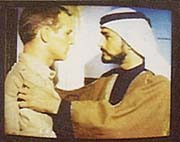 Muqaddimah Li-Nihāyāt Jidāt = Introduction to the end of an argument
by
Call Number: Jones Media DVD #16455Publication Date: 1990Combining news soundbytes, movie clips and documentary footage shot in the West Bank and Gaza Strip, the filmmakers critique Western-based representations of Arab culture. The artists cleverly mimic the Western media tableau in an exhilarating mix of fragmented stereotypes from mainstream movies to prime-time news.
Muqaddimah Li-Nihāyāt Jidāt = Introduction to the end of an argument
by
Call Number: Jones Media DVD #16455Publication Date: 1990Combining news soundbytes, movie clips and documentary footage shot in the West Bank and Gaza Strip, the filmmakers critique Western-based representations of Arab culture. The artists cleverly mimic the Western media tableau in an exhilarating mix of fragmented stereotypes from mainstream movies to prime-time news. -
 Mur = Wall: a cinematic meditation on the Israeli-Palestinian conflict
by
Call Number: Jones Media DVD #3718Publication Date: 2005Simone Britton etches a haunting portrait of one of the most profound geographical markers of our time -- the wall of separation constructed by Israel that shields it from adjacent, conflicted Palestinian territories. This documentary shows how the Wall is destroying one of the most historically significant landscapes in the world, while imprisoning one people and enclosing the other.
Mur = Wall: a cinematic meditation on the Israeli-Palestinian conflict
by
Call Number: Jones Media DVD #3718Publication Date: 2005Simone Britton etches a haunting portrait of one of the most profound geographical markers of our time -- the wall of separation constructed by Israel that shields it from adjacent, conflicted Palestinian territories. This documentary shows how the Wall is destroying one of the most historically significant landscapes in the world, while imprisoning one people and enclosing the other. -
 On the East Side
by
Call Number: Available on VimeoA documentary that follows a day in the lives of a group of friends in East Jerusalem. Abu Daoud shares his grief and grievance with his friends. His son is due to appear in Israeli Military Court the following day. Although they come from varying walks of life, these friends share a deep-seated daily struggle against Israel's occupation.
On the East Side
by
Call Number: Available on VimeoA documentary that follows a day in the lives of a group of friends in East Jerusalem. Abu Daoud shares his grief and grievance with his friends. His son is due to appear in Israeli Military Court the following day. Although they come from varying walks of life, these friends share a deep-seated daily struggle against Israel's occupation. -
 The Other Son / Le fils de l'autre
by
Call Number: Jones Media DVD 16224ISBN: B00ATK0452Publication Date: 2012When he gets ready to join the Israeli army, Joseph discovers that he is not the biological son of his parents and that he was switched at birth with Yacine, the child of a Palestinian family from the West Bank. The lives of the two families are brutally turned upside down by this revelation, which forces them to reconsider their respective identities, their values, and their beliefs.
The Other Son / Le fils de l'autre
by
Call Number: Jones Media DVD 16224ISBN: B00ATK0452Publication Date: 2012When he gets ready to join the Israeli army, Joseph discovers that he is not the biological son of his parents and that he was switched at birth with Yacine, the child of a Palestinian family from the West Bank. The lives of the two families are brutally turned upside down by this revelation, which forces them to reconsider their respective identities, their values, and their beliefs. -
 Palestinian diaries
by
Call Number: Jones Media Video Tape 1357ISBN: B00000G3GKPublication Date: 1990In 1990, an international team provided training and a video camera for three young Palestinians in the occupied territories of the West Bank and the Gaza Strip. For six months, they filmed their own lives
Palestinian diaries
by
Call Number: Jones Media Video Tape 1357ISBN: B00000G3GKPublication Date: 1990In 1990, an international team provided training and a video camera for three young Palestinians in the occupied territories of the West Bank and the Gaza Strip. For six months, they filmed their own lives -
 Paradise Now
by
Call Number: Jones Media DVD 3255ISBN: 141981821XPublication Date: 2006The story of what may be the last 48 hours in the lives of two Palestinian men who have been recruited as suicide bombers. When they are intercepted at the Israeli border, a young woman who discovers their plan causes them to reconsider their actions.
Paradise Now
by
Call Number: Jones Media DVD 3255ISBN: 141981821XPublication Date: 2006The story of what may be the last 48 hours in the lives of two Palestinian men who have been recruited as suicide bombers. When they are intercepted at the Israeli border, a young woman who discovers their plan causes them to reconsider their actions. -
 Pomegranates and Myrrh
by
Call Number: Jones Media DVD 16552Zaid, a Palestinian olive farmer, is thrown in jail for supposedly throwing a stone at an Israeli soldier. His new wife Kamar, who is a folk dancer, throws herself into her work. She clashes with Kais, the lead choreographer of her troupe, but later finds herself attracted to him. She and her family then become embroiled in a land confiscation case, made all the harder because her husband cannot help.
Pomegranates and Myrrh
by
Call Number: Jones Media DVD 16552Zaid, a Palestinian olive farmer, is thrown in jail for supposedly throwing a stone at an Israeli soldier. His new wife Kamar, who is a folk dancer, throws herself into her work. She clashes with Kais, the lead choreographer of her troupe, but later finds herself attracted to him. She and her family then become embroiled in a land confiscation case, made all the harder because her husband cannot help. -
 Port of Memory
by
Call Number: Jones Media DVD on orderAvailable on Vimeo. The history of the town of Jaffa, a thriving port city now part of Tel Aviv, provides the background for Aljafari's most recent film, centering on his mothers family at risk of eviction if they cant find proof that the house they have lived in for decades belongs to them.
Port of Memory
by
Call Number: Jones Media DVD on orderAvailable on Vimeo. The history of the town of Jaffa, a thriving port city now part of Tel Aviv, provides the background for Aljafari's most recent film, centering on his mothers family at risk of eviction if they cant find proof that the house they have lived in for decades belongs to them. -
 Promised lands
by
Call Number: Jones Media DVD 13355Famed writer and critic Susan Sontag's sole documentary project, shot in Israel on the fly in the final days and immediate aftermath of the 1973 Yom Kippur War. Not only does the film scrutinize the ongoing Arab-Israeli conflict, it also brilliantly underscores the deepening divisions within the Jewish thought over the very question of Palestinian sovereignty. Banned by Israeli authorities upon its initial release, it's a visually visceral portrait of a land torn apart.
Promised lands
by
Call Number: Jones Media DVD 13355Famed writer and critic Susan Sontag's sole documentary project, shot in Israel on the fly in the final days and immediate aftermath of the 1973 Yom Kippur War. Not only does the film scrutinize the ongoing Arab-Israeli conflict, it also brilliantly underscores the deepening divisions within the Jewish thought over the very question of Palestinian sovereignty. Banned by Israeli authorities upon its initial release, it's a visually visceral portrait of a land torn apart. -
 Rana's wedding = Al qods fee yom akhar
by
Call Number: Jones Media DVD 5155When Rana is faced with an ultimatum--choose a husband from a list of eligible, respectable men or leave for Egypt--she goes searching for a lover of her own choosing. Moving across checkpoints to the West Bank, finding a wedding dress in a war zone, and settling family differences all in just ten hours, Rana finds ... In Jerusalem, love has many roadblocks.
Rana's wedding = Al qods fee yom akhar
by
Call Number: Jones Media DVD 5155When Rana is faced with an ultimatum--choose a husband from a list of eligible, respectable men or leave for Egypt--she goes searching for a lover of her own choosing. Moving across checkpoints to the West Bank, finding a wedding dress in a war zone, and settling family differences all in just ten hours, Rana finds ... In Jerusalem, love has many roadblocks. -
 Restored Pictures
by
Call Number: Streaming videoWe travel in this documentary between Bethlehem, Haifa and Nazareth to explore the life of Karimeh Abbud - the first female photographer in pre-1948 Palestine. Born in Bethlehem in 1894, Karimeh rapidly rose to prominence in a traditionally male-dominated profession after receiving her first camera as a teenager. Her photos are important historical records of life in Palestine in the early 1900s.
Restored Pictures
by
Call Number: Streaming videoWe travel in this documentary between Bethlehem, Haifa and Nazareth to explore the life of Karimeh Abbud - the first female photographer in pre-1948 Palestine. Born in Bethlehem in 1894, Karimeh rapidly rose to prominence in a traditionally male-dominated profession after receiving her first camera as a teenager. Her photos are important historical records of life in Palestine in the early 1900s. -
 Route 181: fragments of a journey to Palestine - Israël
by
Call Number: Jones Media DVD 16538In the summer of 2002, Palestinian filmmaker Michel Khleifi and Israeli filmmaker Eyal Sivan embarked on a cinematographic journey through their country, Palestine-Israel.For this trip they traced a route on a road map. They called it "Route 181", after resolution 181 adopted by the UN in 1947. This resolution divided Palestine into two states, 56% of land for the Jewish minority, 43% for the Arab majority, and the rest, an international zone. This theoretical line presented as a solution caused the first Arab-Israeli war, which is yet to end. This journey along Route 181 followed this border, that has never existed.
Route 181: fragments of a journey to Palestine - Israël
by
Call Number: Jones Media DVD 16538In the summer of 2002, Palestinian filmmaker Michel Khleifi and Israeli filmmaker Eyal Sivan embarked on a cinematographic journey through their country, Palestine-Israel.For this trip they traced a route on a road map. They called it "Route 181", after resolution 181 adopted by the UN in 1947. This resolution divided Palestine into two states, 56% of land for the Jewish minority, 43% for the Arab majority, and the rest, an international zone. This theoretical line presented as a solution caused the first Arab-Israeli war, which is yet to end. This journey along Route 181 followed this border, that has never existed. -
 Samia
by
Call Number: Available on VimeoSamia, 71, is still feisty, active and committed. She takes us on a journey in Jerusalem and Jericho as she travels the path of a life marked by her struggle for the right of girls to education and the right of Palestinians to live in Jerusalem. Samia has lived wars, Intifadas and times of unrest and has negotiated power with members of her society and with the Israeli occupation. Yet, she has a place in her heart for the tender memories of love.
Samia
by
Call Number: Available on VimeoSamia, 71, is still feisty, active and committed. She takes us on a journey in Jerusalem and Jericho as she travels the path of a life marked by her struggle for the right of girls to education and the right of Palestinians to live in Jerusalem. Samia has lived wars, Intifadas and times of unrest and has negotiated power with members of her society and with the Israeli occupation. Yet, she has a place in her heart for the tender memories of love. -
The Shooter byCall Number: Jones Media DVD on orderPublication Date: 2007In this short film Ihab Jaddallah evokes, not without a certain humor, the stuggle and the resistance of the Palestinians in these times of trouble and chaos through a whimsical self-reference. He thus also denounces the satiric attitude of a journalist, the comportment of the media, spectators and greed for violence. Critical of the instrumentalisation of the war and at the same time manifesting a new generation of Palestinian artists, The Shooter is a meta-film: intelligent, sharp-sighted and skilful. (Paris Cinema)
-
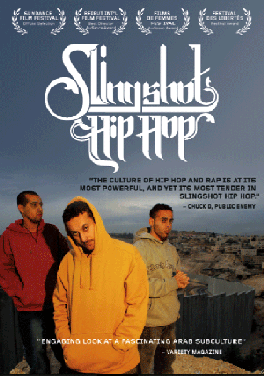 Slingshot Hip Hop
by
Call Number: Jones Media DVD 16593Slingshot Hip Hop braids together the stories of young Palestinians living in Gaza, the West Bank and inside Israel as they discover Hip Hop and employ it as a tool to surmount divisions imposed by occupation and poverty. From internal checkpoints and Separation Walls to gender norms and generational differences, this is the story of young people crossing the borders that separate them.
Slingshot Hip Hop
by
Call Number: Jones Media DVD 16593Slingshot Hip Hop braids together the stories of young Palestinians living in Gaza, the West Bank and inside Israel as they discover Hip Hop and employ it as a tool to surmount divisions imposed by occupation and poverty. From internal checkpoints and Separation Walls to gender norms and generational differences, this is the story of young people crossing the borders that separate them. -
 Soup Over Bethlehem
by
Call Number: Streaming videoSoup Over Bethlehem (2006) depicts an ordinary Palestinian family, Sansour's own, around a dinner table on a rooftop overlooking the West Bank city of Bethlehem. What starts as a culinary discussion about the national dish mloukhieh being served from a soup bowl soon evolves into a personal and engaging conversation about politics -- thereby emphasizing the symbiosis of food and politics so indicative of the Palestinian experience.
Soup Over Bethlehem
by
Call Number: Streaming videoSoup Over Bethlehem (2006) depicts an ordinary Palestinian family, Sansour's own, around a dinner table on a rooftop overlooking the West Bank city of Bethlehem. What starts as a culinary discussion about the national dish mloukhieh being served from a soup bowl soon evolves into a personal and engaging conversation about politics -- thereby emphasizing the symbiosis of food and politics so indicative of the Palestinian experience. -
The story of milk and honey byCall Number: Streaming videoThe Story of Milk and Honey is a short experimental video belonging to a larger project, which includes photographs, drawings and text, detailing an un-named individual's failure to write a love story. Through voiceover narration that weaves together images, letters, and songs, a story of defeat transpires into a journey that explores how we collect and perceive information,understand facts, history, images, and sound and where the individual is to be found in the midst of the material. (source : Arte)
-
Sufair yellow mums by
Call Number: Jones Media DVD #19409Nine year old Nizar is an introverted Palestinian altar boy and a social outcast. During this years' Easter, Nizar decides to compete with the village children in the traditional "breaking eggs" games. His goal is to collect as many eggs as possible in order to sacrifice them in the village church to his beloved Jesus. Nizar's egg is "Mashmaa" (a fake egg that is hardened by wax). Only he and Jesus know this fact. The danger of getting caught is very imminent. Nizar manages to collect many eggs and to gain respect from the village children, until finally he is caught. It would be the first time Nizar questions his faith. -
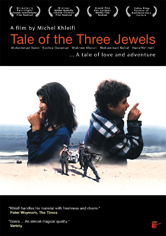 Tale of Three Jewels
by
Call Number: Jones Media DVD #16525Tells the story of twelve-year-old Yusef, who escapes from the chaos of the ongoing Palestinian-Israeli conflict by looking for birds in the tranquil countryside. One day his hunt is interrupted by Aida, a ravishing gypsy girl from a nearby neighborhood. Yusef is immediately smitten, but when he declares his intention of making Aida his bride, she says he must first find the three jewels missing from a necklace that was brought from South America by her grandfather. Yusef quickly formulates a plan to cross the sea in order to fulfill Aida's request and win her love.
Tale of Three Jewels
by
Call Number: Jones Media DVD #16525Tells the story of twelve-year-old Yusef, who escapes from the chaos of the ongoing Palestinian-Israeli conflict by looking for birds in the tranquil countryside. One day his hunt is interrupted by Aida, a ravishing gypsy girl from a nearby neighborhood. Yusef is immediately smitten, but when he declares his intention of making Aida his bride, she says he must first find the three jewels missing from a necklace that was brought from South America by her grandfather. Yusef quickly formulates a plan to cross the sea in order to fulfill Aida's request and win her love. -
 They Do Not Exist
by
Call Number: Streaming videoSalvaged from the ruins of Beirut after 1982, Abu Ali's early film has only recently been made available. Shooting under extraordinary conditions, the director, who worked with Godard on his Ici et Ailleurs (Here and Elsewhere), and founded the PLO's film division, covers conditions in Lebanon's refugee camps, the effects of Israeli bombardments, and the lives of guerrillas in training camps. They Do Not Exist is a stylistically unique work which demonstrates the intersection between the political and the aesthetic.
They Do Not Exist
by
Call Number: Streaming videoSalvaged from the ruins of Beirut after 1982, Abu Ali's early film has only recently been made available. Shooting under extraordinary conditions, the director, who worked with Godard on his Ici et Ailleurs (Here and Elsewhere), and founded the PLO's film division, covers conditions in Lebanon's refugee camps, the effects of Israeli bombardments, and the lives of guerrillas in training camps. They Do Not Exist is a stylistically unique work which demonstrates the intersection between the political and the aesthetic. -
 Thirst = Atash
by
Call Number: Jones Media DVD 9549Publication Date: 2003Abu Shukri and his family have settled alone in a valley far from their home town. Tyrannical father Shukri rules the home with an iron fist, forcing his wife and three children to burn fires all day to make charcoal. When he decides to build a pipeline to bring fresh water to their home, it awakens their instinct for freedom, but carries with it tragic consequences for the entire family.
Thirst = Atash
by
Call Number: Jones Media DVD 9549Publication Date: 2003Abu Shukri and his family have settled alone in a valley far from their home town. Tyrannical father Shukri rules the home with an iron fist, forcing his wife and three children to burn fires all day to make charcoal. When he decides to build a pipeline to bring fresh water to their home, it awakens their instinct for freedom, but carries with it tragic consequences for the entire family. -
The Visit by
Call Number: Streaming video -
Wedding in Galilee = Urs al-Jalīl = Noce en Galilée byCall Number: Jones Media Videotape #4831ISBN: 6301438388A Palestinian seeks Israeli permission to waive curfew to give his son a fine wedding. The military governor's condition is that he and his officers attend. The groom berates his father for agreeing. Women ritually prepare the bride; men prepare the groom. Guests gather. The Arab youths plot violence. One Israeli officer swoons in the heat and Arab women take her into the cool house. A thoroughbred gets loose and runs to a mined field; soldiers and Arabs must cooperate to rescue it. As darkness falls, tensions between army and villagers rise, and the groom's wedding-night anger and impotence threaten family dignity and honor. Can cool heads prevail?
-
Yala to the Moon by
Call Number: Available on YouTubePublication Date: 2012An official selection at TIFF KIDS film festival Nine year old Aseel peddles cds on the streets of the West Bank by day and uses her imagination, trash and a little help from her magical friends to escape reality and remake the world around her. -
[Yadon ilaheyya] = Divine intervention: a chronicle of love and pain byCall Number: Jones Media DVD #3085At the center of the Middle East conflict, hearts beat in tragic comedy and deadpan irony: a sexy young Palestinian woman defies Israeli soldiers and struts through a check-point as if it were the catwalk of a fashion show, Santa Claus is chased up the sun-drenched hills of Nazareth by a gang of knife-wielding school kids, Israeli police use a blindfolded prisoner to provide directions to tourists in Jerusalem, a Palestinian collaborator casually extinguishes his firebombed house on a daily basis, and a female ninja descends from the sky, holding the map of ‘Palestine’ as her battle shield. These are but a few of the provocative images that filmmaker Elia Suleiman puts forth in his critically-acclaimed satire chronicling the absurdities of life and love on both sides of the Palestinian-Israeli border
-
Ṣuwar min mudhakkirāt = La mémoire fertile = Fertile memory byCall Number: Jones Media DVD 16445ISBN: B00019G4W8Publication Date: 1980Blending both documentary and narrative elements, Khleifi crafts a story of two Palestinian women whose individual struggles both define and transcend the politics that have torn apart their homes and their lives. Shot within the disputed Palestinian West Bank "Green Line."